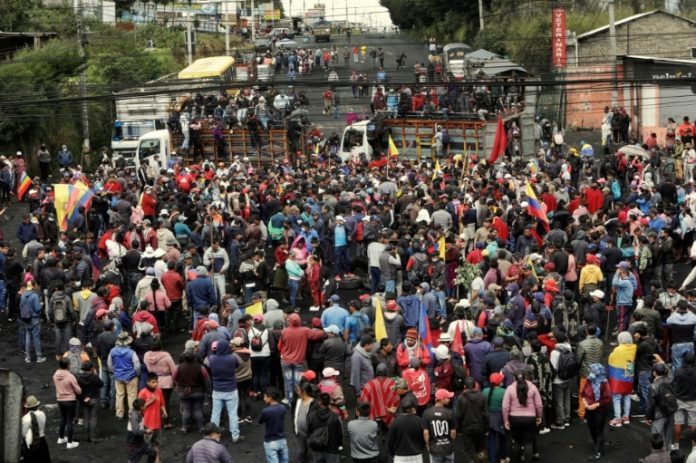Anti-government protests by indigenous groups in Ecuador have left two people killed and 100 injured, with the country’s defense minister warning that democracy in the Latin American state is at risk.
“The armed forces will not allow constitutional order to be broken or any action against democracy and the laws of the republic,” Defense Minister Luis Lara declared in a press briefing on Tuesday while accompanied by military commanders, alleging the involvement of drug traffickers and organized crime in the violent protests.
Echoing right-wing President Guillermo Lasso – who claims drug gangs are causing surging violence, including deadly prison riots that have killed hundreds – Lara said that recent violent protests “go beyond a citizen protest; this amounts to a deliberate effort to use violence to threaten democracy, endanger institutions.”
His remarks came as Ecuador’s capital remained virtually paralyzed amid growing signs of food and fuel shortages and reports of clashes between indigenous protesters and police forces.
READ ALSO: Burkina Faso announces military zones ahead of anti-militant operations
The protesters, who have held more than a week of marches and road blockades over Lasso’s economic policies, will not negotiate with the government until it withdraws police forces from some areas of the capital, said an indigenous leader as cited in local press reports.
“Our conditions suppose a willingness by the national government to reduce repressive actions, overturn the state of exception and demilitarize Arbolito Park,” said Leonidas Iza, the leader of the indigenous group CONAIE on social media, referring to the special measures that Lasso extended to six provinces on Monday from a previous three.
Two people have died during demonstrations, Iza added, while nearly 100 have been injured and another 79 arrested, according to indigenous tallies.
Thousands of demonstrators have marched in the capital, Quito, over the last week to demand concessions from Lasso, including a fuel price cut, a halt to the expansion of oil production and mining, more time for farmers to pay debt, and budget increases for healthcare.
Lara further emphasized during his nationally-televised remarks that the military was watching events with concern amid the “manipulation of social protests and the growth in violence by those who have rejected dialog.”
Security forces and protesters clashed in the capital on Tuesday afternoon, with some participants throwing sticks. Police forces responded by firing tear gas and non-lethal projectiles, news outlets reported, citing witnesses.
Residents of the capital awoke to find some roads closed and parts of public transport shuttered. Major highways into Quito have been blocked since protests began a week ago and the city’s airport said some flights were being affected.
The protests have prevented the production of some 189,000 barrels of crude, according to a statement released by Ecuador’s Energy Ministry, extending a force majeure declaration by state-run oil Petroecuador to include private operators.
The ministry has also invoked contract clauses that prevent lawsuits from being filed by hydrocarbon operators over unfulfilled contracts as the protests affect output. Protesters have reportedly entered oil fields, forcing companies to shut down almost 609 wells in the Amazon, leading to a loss of nearly 30,000 barrels per day.
The violence marked an escalation of protests that began eight days earlier, when the powerful Indigenous Nationalities Confederation called for an indefinite strike to press its demands that President Lasso slash fuel prices, impose price controls on agricultural products, and increase the education budget, among other issues.
Images in local media outlets further showed damage to the prosecutor’s office, which is next to a focal point for the protests, Salesiana University. Officials in the office requested assistance from the police and military and said they were moving files with sensitive information to a safe location to ensure investigations were not affected.













